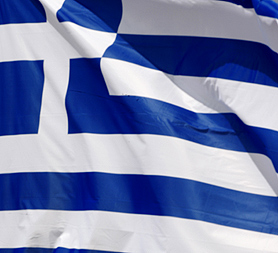Greece asks EU-IMF for rescue loans
Updated on 23 April 2010
Debt-laden Greece has formally asked for a 45bn euro emergency bailout from the International Monetary Fund and the European Union.

The first injection of funds is expected in under a month, yet the news did little to ease uncertainty in the financial markets.
City experts deemed the move a temporary sticking plaster for a long-awaited bailout.
"The true fact of the matter is that 45 billion isn't enough to sort out the Greek problem", David Morrison, market strategist at GFT Global said.
Indeed, shares in Greek banks crept up just 0.1 per cent before the markets closed.
Meanwhile, queries over how the loan would be paid and what delays might occur were raised.
"Concerns remain during this transitory phase as regards the terms that will be asked for the loans with markets also watching the process of aid approval," said analyst Nick Galousis at Kappa Securities in Athens.
The Greek's appeal to the IMF and the EU comes under overwhelming pressure from financial markets to rescue a member of the euro zone, and could be the largest state bailout ever attempted.
Prime Minister George Papandreou pulled the trigger to enact the loan after borrowing costs in Greece climbed to record levels - scuppering Athens' efforts to cut its 300bn euro debt mountain.
"It is a national and imperative need to officially ask our partners in the EU for the activation of the support mechanism we jointly created," Mr Papandreou said in a live from the Aegean island of Kastellorizo today.
"The time that was not granted to us by the markets will be given to us by the support of the euro zone," he added.
Channel 4 News economics editor Faisal Islam described Mr Papandreou's announcement as a "humiliation".
"This is a humiliation for Greece and its prime minister as it was for Britain in 1976," he said.
"This will end up probably being the biggest bail-out in world history."
Markets rallied briefly, before falling back on concerns that the move could set a precedent for other underperforming countries in the euro zone.
"On the one hand it could be perceived a relief that Greece is taking the financial help but it does not address the systemic risk and begs the question as to whether countries like Spain may look for the same rescue package in the near future," said Simon Brown, chief executive of financial analysts Prospreads.
The plea for the emergency loan follows yesterday's revelation from the European Commission that Greece's 2009 public deficit climbed to 13.6 per cent of gross domestic product was higher than predicted - driving Greek bond yields to 12-year highs, making borrowing prohibitive.
Ben May, an economist at Capital Economics, said the call for funds did not mark the end of the crisis. "They've still got the medium-term problems of getting their public finances in order, and obviously the issue of competitiveness."
The euro zones have pledged 30bn euros between them and the IMF 10-15bn euros, but experts question if the funds will cover the 39bn euro debt Greece is expected to wrack up over the next 12 months, on top of costs outlined in the 2010 budget deficit.
"In the longer-term, it's just a sticking plaster over the situation," said Daragh Maher, deputy head of forex strategy at Credit Agricole CIB.

